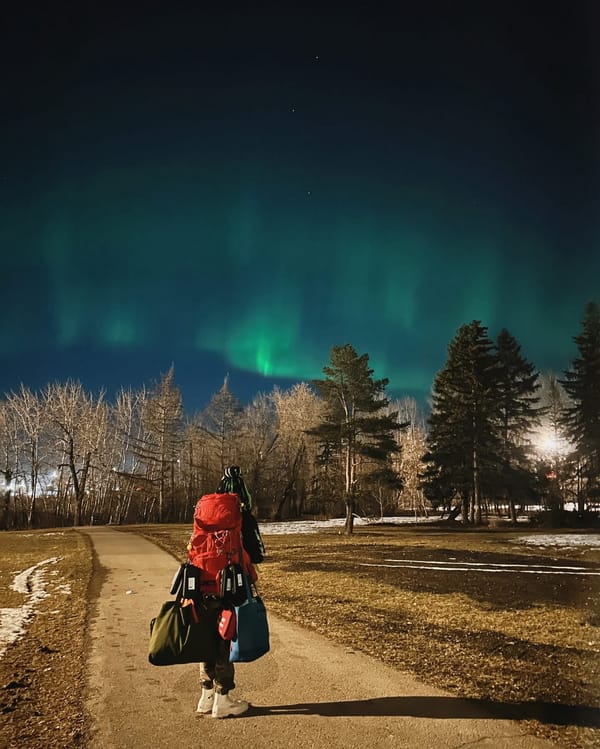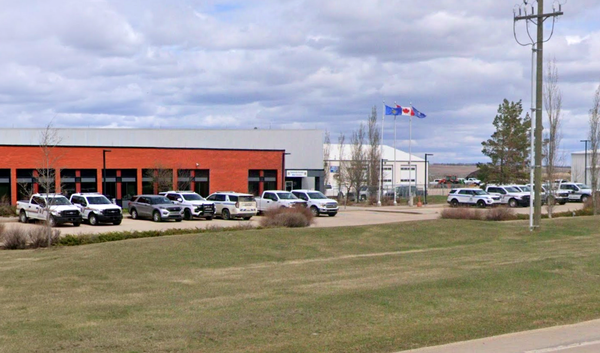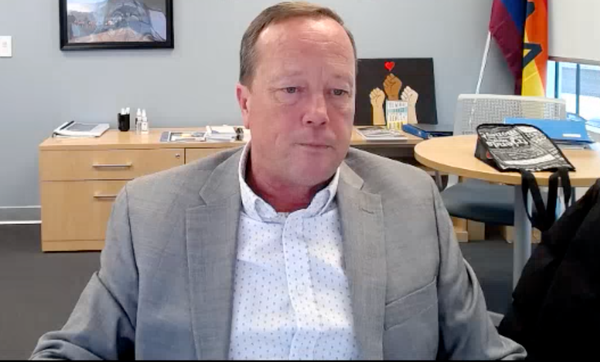Police are absorbing public assets
This week, CBC Edmonton held its first regular morning show segment with the Edmonton Police Chief. Will hilarity ensue? Read on!
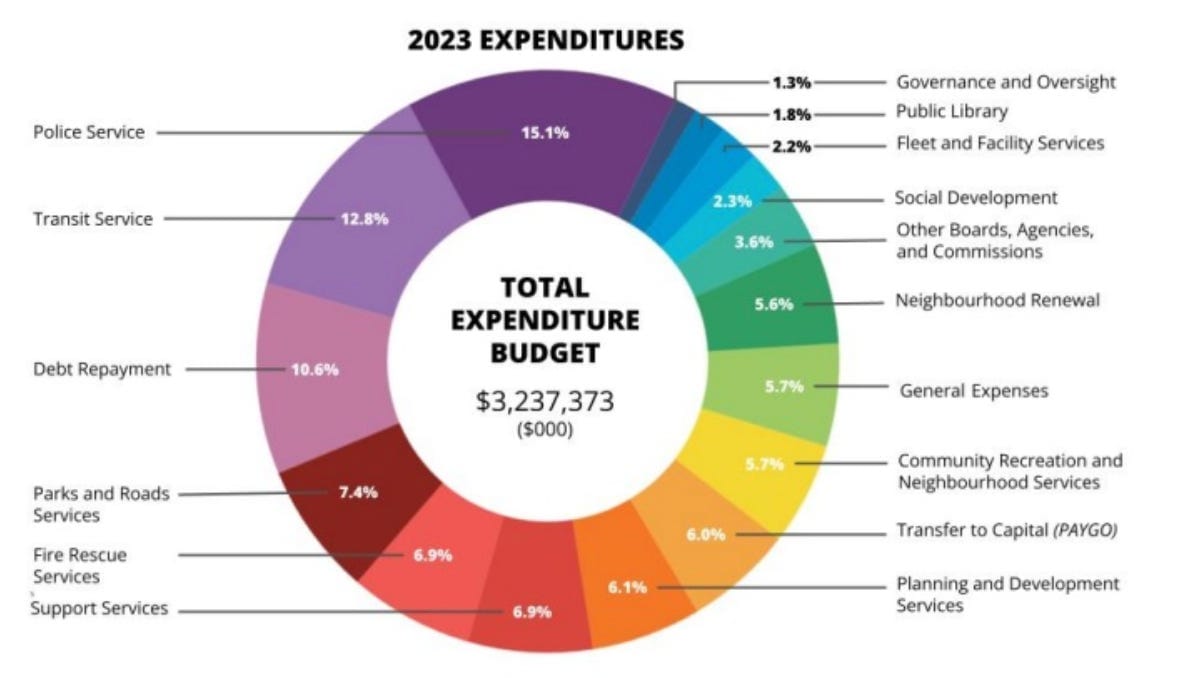
Set & Setting: Edmonton AM, CBC Edmonton’s flagship morning radio show, had Police Chief Dale McFee on the air this week for the first of a “regular” segment. Interviewer Mark Connolly was quick to press McFee on his evasive responses, but the damage will run deep if CBC persists in platforming copaganda as news.
Here’s the segment if you want to follow along!
“It’s mandatory…but EPS has not done this…?”
Mark Connolly opens up the interview asking why EPS doesn’t report on its practices around carding or street checks: the police practice of stopping (typically) racialized or impoverished people without cause, frequently resulting in “discovery” of greater crimes such as (gasp!) drug possession or unpaid fines.
Chief McFee: “we won’t be doing street checks…except in the execution of our duties.” Then, he deflects by launching into the EPS Know Your Rights campaign, which sets procedures that both police and public should follow in the event of a stop.
On the surface, it sounds great — translated to 16 languages! But in practice, we know that as police budgets continue to balloon, there will be a lot more cops on the ground looking for things to do. But let’s get back to what “the execution of duties” entails.
Turns out, a lot. Let’s check out the Alberta Police Act, page 32:
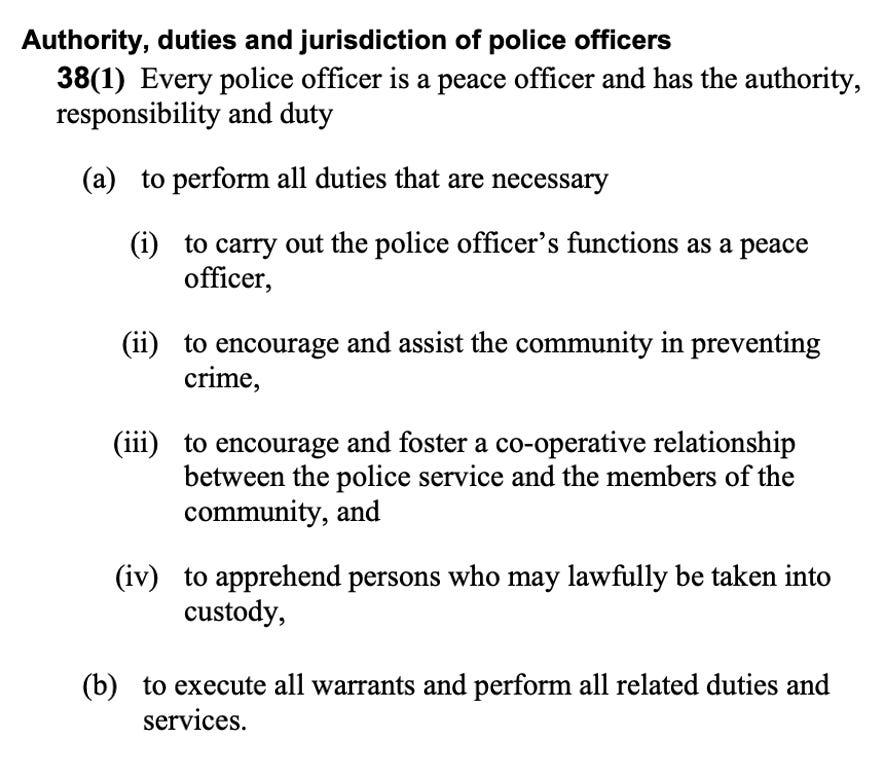
Not suggesting that ‘keeping the peace’ shouldn’t be the role of the police — it should technically be their only role. But (a)(i) “function as a peace officer” is pretty broad: loitering (another word for “being racialized or impoverished in public”) or anything falling under the giant dome of “social disorder” could constitute a breach of peace.
Meanwhile, ‘crime prevention’ is growing in popularity among police forces. I won’t get all Minority Report here, but this also seems dangerously broad and could encompass anything that could be defended as suspicious activity. Recall any killing of an unarmed civilian by police and how it was publicly defended by the police.
The main question here: can’t we arrive at thinking of “crime prevention” as meeting people’s basic needs, not surrounding them with armed uniforms? Here’s a 5 minute presentation I gave to Calgary city council on that topic.
Suffice to say, “no recording of any information except in the execution of their duties” sounds great but doesn’t change anything. The hard numbers — in particular the race-based data — are what’s needed, and what Connolly’s after here.
So Connolly asks again, TWICE: “So when will that yearly report come — at the end of this year then, or…?”
McFee: “I’ll have to get back to you on that.”
🚨 Police make their own rules.
“I know it’s gotten complicated”
Throughout 2022, there was a visible push from the Province to have Edmonton City Council expand funding for EPS.
You might recall very sudden public pressure from the Province immediately after the RCMP-EPS fumble of Justin Bone’s volatile situation, which Chief McFee was caught lying about, resulted in the killings of Hung Trang and Ban Phuc Hoang.
But City Council folded. In the announcements about Chinatown’s Healthy Streets Operations Centre, it was touted as an “integrated” unit with fire services, social services, paramedics and police. But in reality, it’s dominated by police, with a couple token firefighters and a handful of Community Safety Liaisons.
What is a Community Safety Liaison? Oh, they work for the Neighbourhood Empowerment Team (NET).
What’s NET, you ask? Surprise! It’s the police again, sifting funding from United Way and joining up with a local nonprofit partner.
🚨 Police integrate with health and social services to prey on their funding.
Where there be homeless, there be criminals
McFee: “You do have the individuals that are struggling but you also have the criminals that have infiltrated that…” and wait for it — wait for it: “and when you use drugs and put drugs in the centre of this, and meth…” BAM! Six Minutes to Meth!
Everyone knows it: Unhoused people LOVE drugs. And drugs is crime, so it’s only natural to conflate criminality with houselessness.
Let’s get it straight: unhoused people use drugs, criminal parasites sell them drugs, police chase the criminal parasites AND the unhoused people-turned-criminal drug buyers, and those in power reject building housing in favour of planes, helicopters, and nonprofit funding for police to do this important work.
Chief McFee has publicly dismissed decriminalization of drugs, ignoring the fact that the whole point of decriminalization is to get cops out of the lives of people who use drugs.
Makes sense: so long as drugs stay illegal, police make bank (more on that to come). But as we move toward regulating the drug supply, they’d better have a backup plan.
🚨 Drugs require a response only the carceral system can deliver.
“Visible presence works”
But there just isn’t enough money to keep a visible presence, right Chief?
“If you’re looking at someone with a drug problem, who’s violent, the answer isn’t going to be a house. Housing’s part of the solution but… we’ve become one-dimensional and the continuity of services…” etc and then reinforces the idea that these services must be delivered in teams. There’s that integration again 🚨.
Then a real gem: “For those that aren’t a danger to themselves and the community, it’s not the criminal justice system. But it’s not ‘nothing’, either… if they’re infiltrated [by criminal elements], then it becomes part of the justice system.” [emphasis mine]
This echoes a statement by Calgary Police Chief Mark Neufeld at a Calgary Police Commission meeting in September 2022: “there’s certain people that need jail and that’s what the police need to do…nobody else occupies that space. We do.”
Connolly then asks how we continue to justify so much more money for policing when it seems to come at a cost to other services, but apologetically closes his question by reaffirming the unquestionable need for big police budgets alongside.
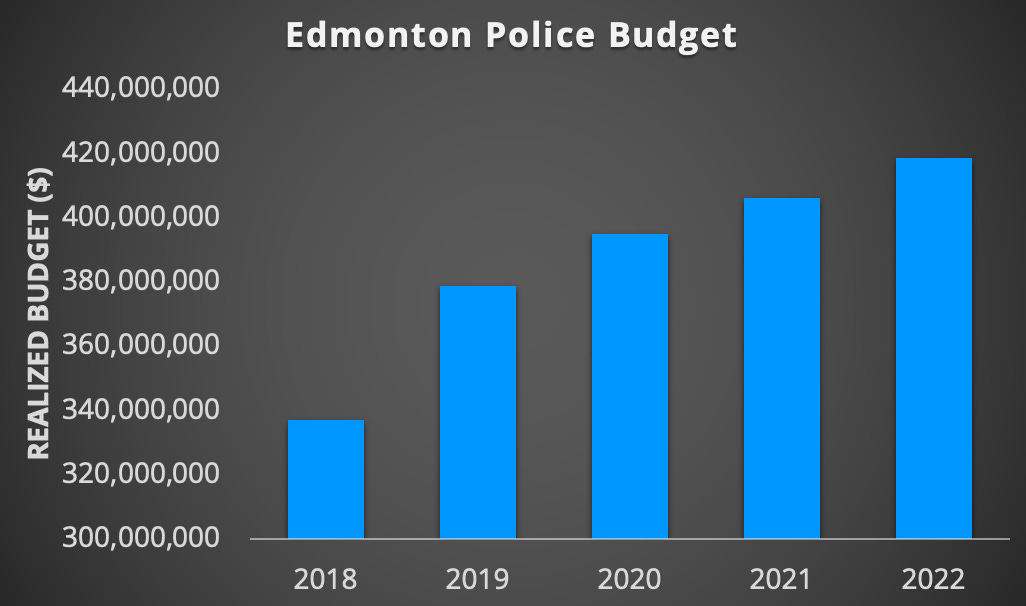
McFee: “You won’t have well-being without safety.” What some police do understand, but those in power will never admit: some people can’t be safe around police. “So the police are at the centre and an integral part of this, they don’t have to lead everything, but they need to be part of most of it.”
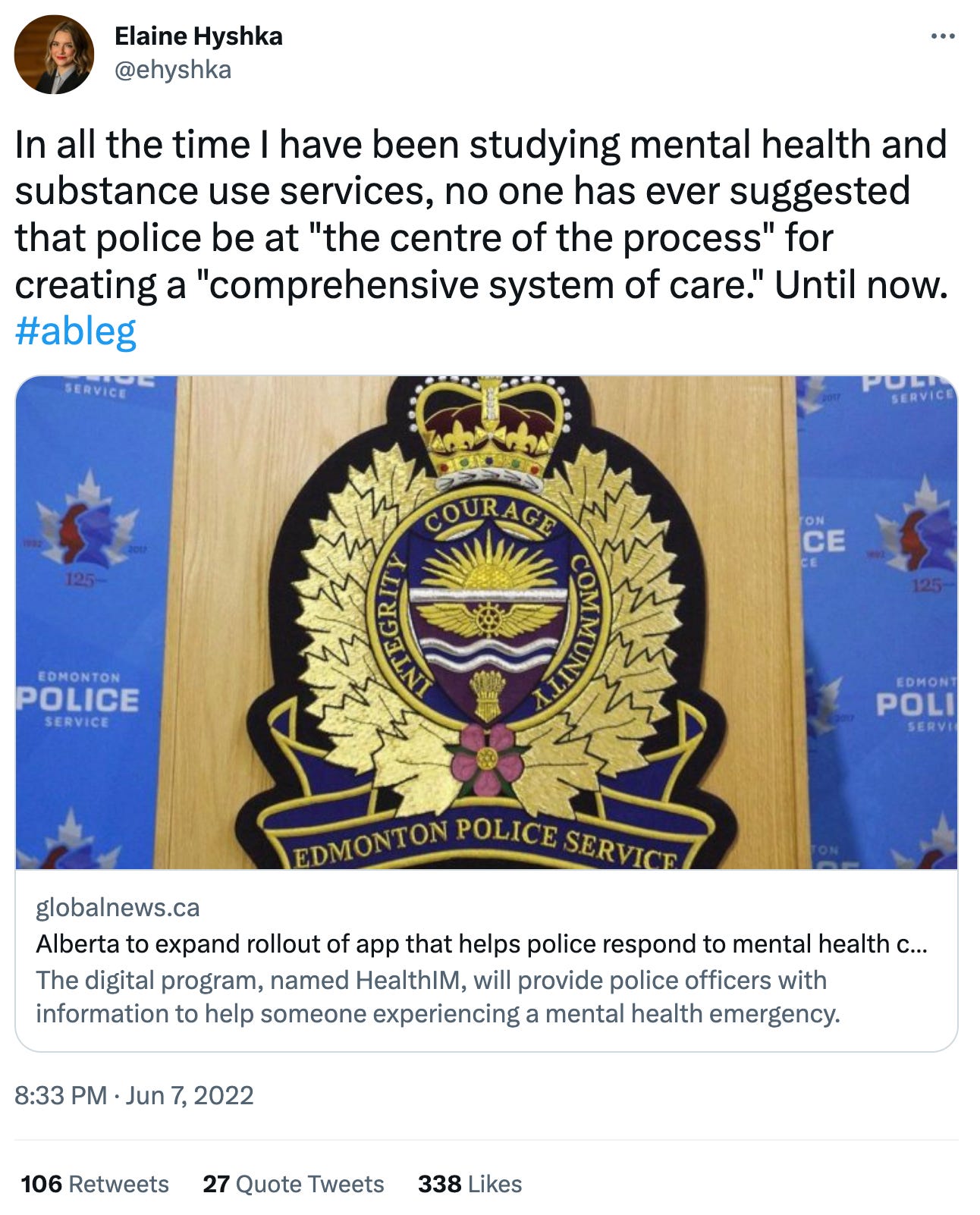
Finally, McFee: “I get a little tired of this conversation about money. Because this isn’t just about money, this is about aligning a system to get help… I’m encouraged sitting on the task force with the Province… I think it’s as good as I’ve seen.”
He means the Public Safety Task Force announcement where Chief McFee joined provincial ministers in openly musing about forcing unhoused people into addiction treatment. The task force that excluded more progressive inner-city councillors in favour of UCP-friendly ones, and did a sneaky end-run around Mayor Sohi.
(If you’re wondering, forced addiction treatment is inhumane, does not work and puts people in danger: if they are temporarily abstinent but resume use, they are extremely susceptible to overdose. But it does pass as a business model at the moment.)
🚨 There’s never enough money for policing, which is the only road to public safety.
Chief McFee, RentSeeker
Next: “If you look at the ecosystem of human services in Edmonton, police are probably 6% of the spend.” WHAT.
Chief McFee gets his budget from the city. That means he competes for city expenditures. Here’s how that breaks down, and surprise again! The police are on top:
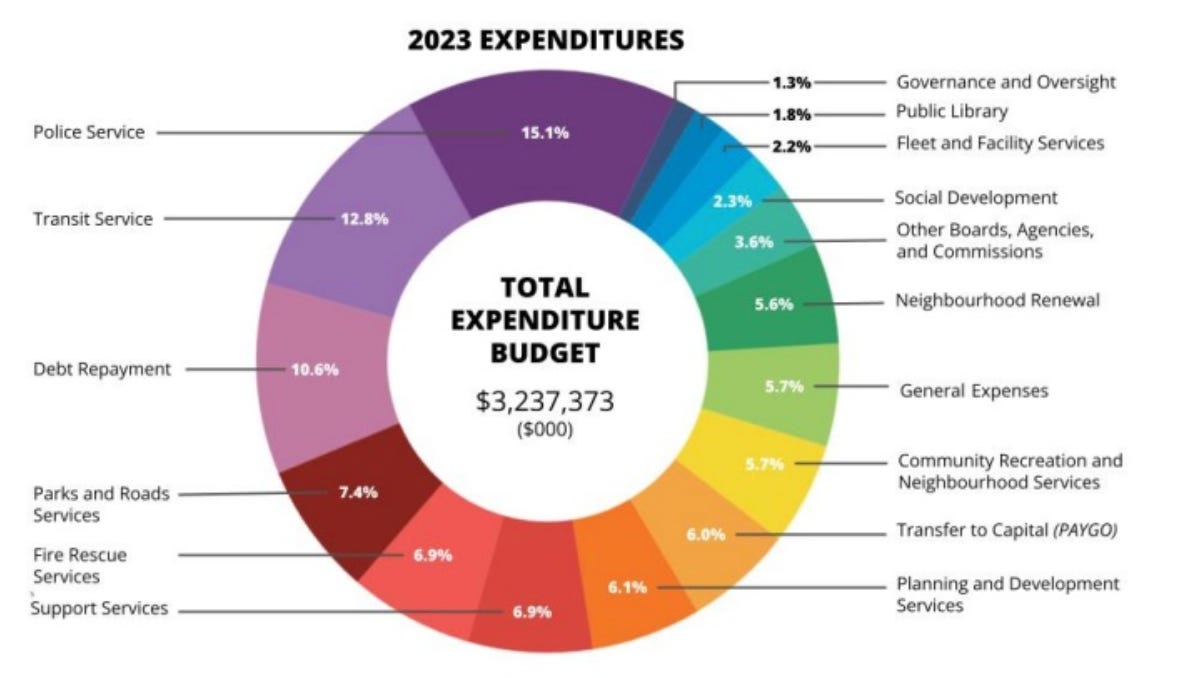
But to be clear, it’s not just the civic expenditures we should concerned with. As illustrated by NET, police also absorb nonprofit resources to do ‘police work’.
And he reveals a critical line of thinking with his 6% figure. You might have seen the recent revelation that police across Canada, including EPS, have commissioned reports from Calgary-based HelpSeeker Technologies. HelpSeeker mines their social services databases to create clumsy audits that are just good enough for police departments to use for hoodwinking the public.
But the audits include “Canada Pension Plan, Old Age Security, Employment Insurance and child tax benefits”. Are we meant to contextualize police spending within all public spending at every level of government? Why not throw in the hot dogs, beer and barbecue sauce that keep us socialized?
🚨 Police, with willing nonprofit and for-profit partners, hold the solutions to poverty.
Why, CBC Edmonton? Whyyyyyy?
The segment wraps up as Connolly quickly informs listeners that Chief McFee will be a regular guest on Edmonton AM.
Yes, we need to hear different perspectives and yes, police are people in Edmonton. But can’t they see this is a hostile takeover of public services by police and public airwaves by their propaganda?
Napoleon, who may well have an admirer in McFee, comes to mind: Public opinion is a mysterious and invisible power, to which everything must yield.
There are many good reasons why police budgets are so contentious. Will they invite someone from BLM or an Indigenous land rights activist for a regular segment? Perhaps Temitope Oriola, Professor of Criminology at the University of Alberta?
It's noteworthy that someone at CBC Edmonton facilitated this segment and signed off.
And Chief McFee has everything to gain here by normalizing his subtext:
🚨 Police make their own rules.
🚨 Police integrate with health and social services to prey on their funding.
🚨 Drugs require a response only the carceral system can deliver.
🚨 There’s never enough money for policing, which is the only road to public safety.
🚨 Police, with willing nonprofit and for-profit partners, hold the solutions to poverty.
It's so worth pushing back on this: let CBC Edmonton know what you think by emailing them: edmontonam@cbc.ca


